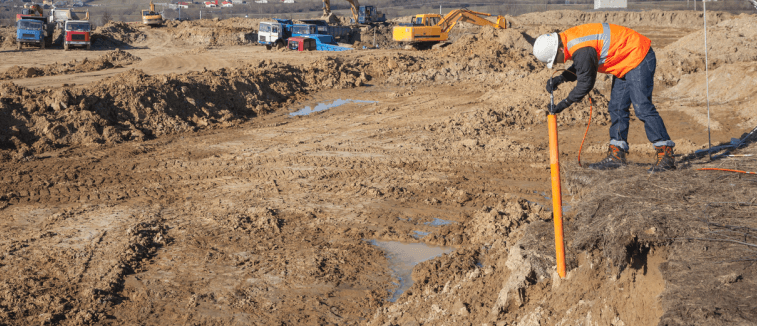Geotheta for Dummies
Geotheta for Dummies
Blog Article
Getting My Geotheta To Work
Table of ContentsThe 20-Second Trick For GeothetaThe Buzz on GeothetaAll about GeothetaNot known Details About Geotheta
They work together with civil designers, architectural engineers, architects, and various other experts to integrate geotechnical considerations right into the general job design and building process. This requires effective teamwork, coordination, and interaction to make certain that the geotechnical aspects straighten with the job purposes and satisfy regulative needs.Mining & Products Engineering: Concepts of boring, penetration prices, and aspects affecting the selection of boring method. Characteristics of nitroglycerins, firing systems and blast patterns. Blowing up techniques in surface area and underground operations. Special blowing up methods at excavation perimeters. Vibration and sound control. Mechanical and constant strategies to fragmentation, consisting of longwall shearing and fullface boring.
Modelling of piece and bit size circulations; comminution as a transfer feature. Comminution technology: squashing, grinding, dimension category. Integrated analysis of fragmentation and comminution operations. Used by: Mining & Products Engineering.
All About Geotheta
Bachelor's level programs in civil, geotechnical, geological, and ecological design normally last 4 years and include general education programs in English, social science, and the humanities, in addition to programs in sophisticated mathematics, structural geology, and fluid mineralogy. (https://forums.hostsearch.com/member.php?265240-geotheta)
Geotechnical engineering entails the evaluation of the dirt and rock problems at a particular site, and their effects for the growth of that site. As many structures count on the ground for support, it is without shock that a detailed understanding of the ground conditions, and the suitability of foundation systems, are crucial to the lasting security and efficiency of the structure or framework.
Being experts in the examination of geological formations and ground behaviour, geotechnical engineers carry out clinical investigations and testing to recognize the influence these geological developments might carry the design and building of structure, civil and facilities jobs. This proficiency is critical for the layout and construction of buildings, roads, tunnels, dams, bridges, and supply of water and sewage systems.
The geotechnical team at Douglas Partners consistently speak with designers, design engineers, designers, and builders to make recommendations on layout and growth propositions to make sure that the developed structures are suitably designed for the ground problems. For instance, the style of footing systems needs to think about the weight of the structure, the capacity of the ground to sustain that weight with each other with activity tolerances and effective building.
Little Known Facts About Geotheta.
This task is significantly simplified by the usage of our Douglas Map geospatial system that makes this information readily obtainable in an easy to make use of internet browser user interface. A geotechnical engineer will direct the boring of boreholes and examination pits to gather soil and other examples, and also examine surface area functions and ground direct exposures to create a geotechnical design of the subsurface problems.
Relying on the project kind and ground conditions experienced, research laboratory testing may amongst various other things evaluate toughness, compressibility, reactivity and/or permeability of dirt and rock samples. Hereafter data is collected and looked at, the outcomes are utilized for a geotechnical model of the site, which is generally provided as areas across the site.

A geotechnical investigation by nature can just assess the ground conditions at the areas drilled or excavated. All-natural variations in soil and rock conditions can take place across a website and in between test areas. It is for that reason great practice that the geotechnical engineer be kept throughout building and construction of the task to supply on-site confirmation that the ground problems encountered are consistent with the expectations and advice provided in the geotechnical examination record.
7 Simple Techniques For Geotheta
Geotechnical engineers use their extensive expertise of soil and rock to analyze threat and fix issues on diverse infrastructure projectsGeotechnical design is a specialist branch of civil design which checks out the behaviour of earth products and the application of soil and rock technicians. Consulting Engineer. As a geotechnical engineer, you will assess the physical, mechanical and chemical properties of dirt and rock in order to develop foundations, preserving structures and earthworks
Geotechnical engineering is carefully connected to and overlaps with, both engineering geology and ground design - https://geotheta.jimdosite.com/. It's feasible to be experts in geotechnics or work for a geotechnical company yet be recognized as a design rock hound or a ground engineer. As a geotechnical engineer, you'll need to: build and keep partnerships with customers and other professionals involved in the website, throughout each projectmaintain safety and security requirements on site bear in mind expense effects you can try this out when you make recommendationsstudy geological maps and aerial photographs from a series of resources and from various time periodsexamine building and construction intends to see exactly how feasible they are based upon your understanding of the siteinvestigate risks or geological dangers for the sitesearch for environmentally delicate features, such as garbage dump start to establish factual and interpretive ground modelsplan area investigationsdrill and analyse examples of bedrock, soil, groundwater and additional materials oversee various other professionals on sitesolve technical concerns as they develop, such as unexpected frameworks at drill sitesmonitor conditions during and after construction to make sure frameworks are secure in the short and lengthy termadding information collected on site to your first researchcreating geotechnical calculations, drawings, and 2 or three-dimensional computer system models analyzing the datamaking recommendations regarding the recommended use of the website

Report this page